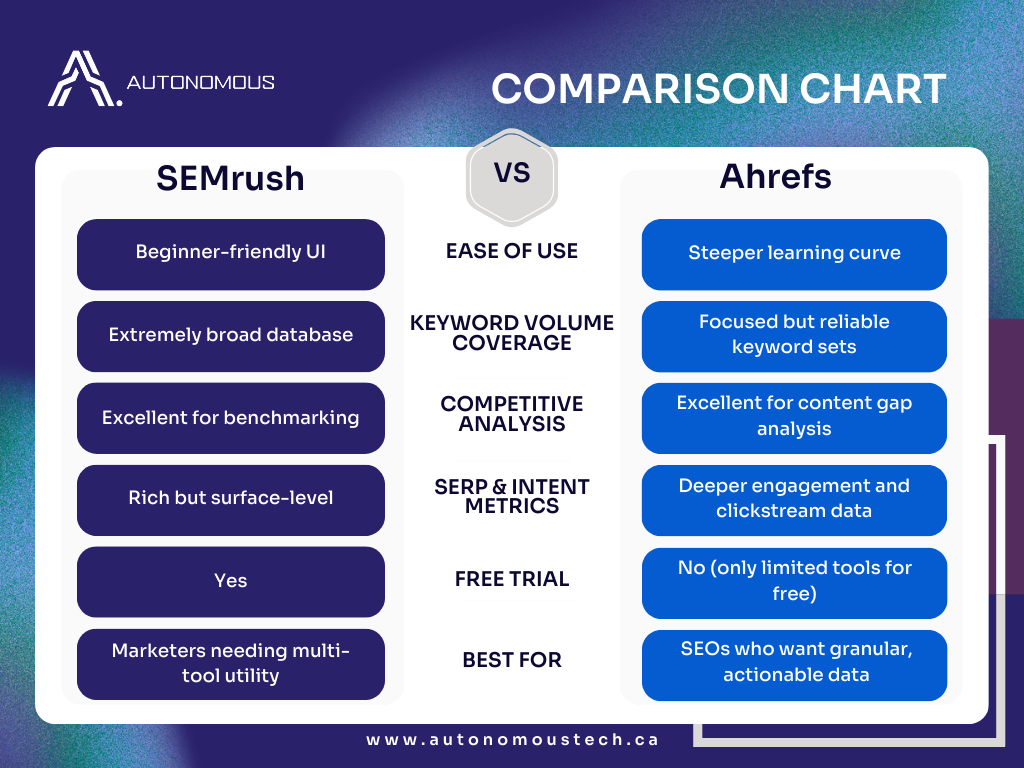In today’s digital game, content visibility is king—and keyword extraction is the not-so-secret weapon behind it. Whether you’re launching a fresh product page, fine-tuning your blog strategy, or building topical authority, the right keywords make all the difference. And when it comes to picking the right keyword research tool, the conversation often comes down to two names: SEMrush and Ahrefs.
Both are powerhouse platforms. But when it comes to keyword extraction, who does it better? Let’s break it down.
What Is Keyword Extraction—and Why Should You Care?
Keyword extraction is the process of identifying relevant keywords from large volumes of text or competitor data. In simpler terms, it’s how you find out what your audience is searching for, how your content aligns (or doesn’t), and where your SEO opportunities are hiding.
Here’s what makes keyword extraction crucial:
Better content targeting → You write for what people are actually searching.
Competitive edge → Find gaps your competitors are ranking for—and fill them.
More conversions → Aligning content with search intent means attracting the right traffic.
Whether you’re working on SEO for startups or managing high-growth B2B content strategies, intelligent keyword discovery is how you stay visible, relevant, and strategic.
SEMrush for Keyword Extraction: A Full-Stack Approach
SEMrush positions itself as an all-in-one digital marketing suite, and that’s not just branding—it delivers across SEO, PPC, content, and competitive intelligence.
Keyword Magic Tool
The Keyword Magic Tool is SEMrush’s headline act for keyword extraction. Here’s why marketers love it:
- Huge keyword database (20B+ terms across markets)
- Smart filters & segmentation for long-tail and question-based queries
- Keyword Difficulty Score so you know what’s realistic to rank for
Organic Research + Position Tracking
What makes SEMrush extra helpful is how it ties keyword extraction to competitor analysis and performance tracking:
- Spy on what your competitors rank for—and what you’re missing
- Track your keyword positions over time
- Layer in SERP features like featured snippets or People Also Ask
Use SEMrush if: You want a holistic view of your SEO environment and need a tool that integrates with your broader digital strategy.
Ahrefs for Keyword Extraction: Depth Over Breadth
Where SEMrush spreads wide, Ahrefs goes deep. Its UI may feel a bit more technical, but if you live and breathe SEO, the insights are worth the extra clicks.
Keywords Explorer
The Keywords Explorer in Ahrefs is where the magic happens:
- Clickstream data that shows actual user clicks, not just search volume
- Return rate & click potential, which helps gauge intent
- SERP snapshot so you can size up the current top-ranking pages
Content Gap Analysis
This is where Ahrefs shines for advanced keyword extraction:
- Find keywords your competitors rank for—but you don’t
- Identify keyword opportunities across multiple domains
- Build content that bridges strategic gaps in your SEO funnel
Use Ahrefs if: You’re a data-driven SEO who needs high-trust data and competitive depth.
SEMrush vs Ahrefs: Quick Comparison

Which Keyword Tool Is Right for You?
At Autonomous, we’ve used both for client projects ranging from SEO for fast-scaling startups to enterprise content audits. Here’s how we’d sum it up:
Go with SEMrush if you:
- Want an all-in-one SEO + marketing toolset
- Need quick wins with a user-friendly interface
- Want to support content, ads, and social under one platform
Go with Ahrefs if you:
- Need to do deep keyword mining and precision content planning
- Value raw SEO power over usability
- Focus heavily on backlinks and content gap strategies
Final Thoughts: Keyword Extraction Is a Process, Not a Checkbox
Choosing between SEMrush vs Ahrefs for keyword extraction isn’t about finding the “better” tool—it’s about choosing the right fit for your workflow. And honestly? If budget allows, using both in tandem can supercharge your SEO strategy.
No matter which platform you choose, remember this: keyword extraction isn’t just about ranking—it’s about resonance. It’s about understanding your audience at a language level, and showing up in the moments that matter.
That’s the real SEO win.




